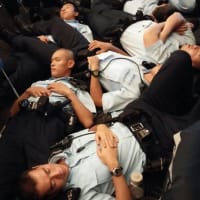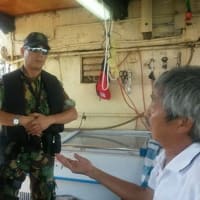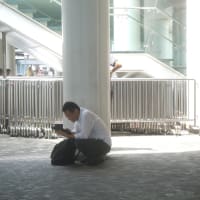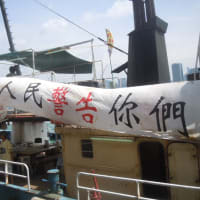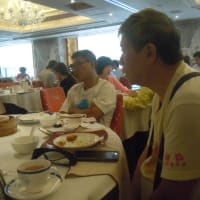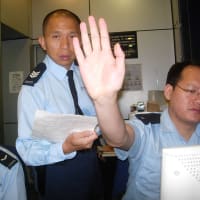━━━━━━━━■FOX新聞館 《中国》■━━━━━━━━
フォックス淳子 NEWSデータベース
0063号 2005.05.22 発行
大陸被指培訓網上打手
(中国政府ネット世論操作の秘密部隊を養成)
━━━━━━━━━━━━━━━━━━━━━━━━━━━━━
大陸被指培訓網上打手
(明報 2005.05.22)
【明報專訊】據「美國之音」報道,中國政府新?一種控制互聯網言論的手法,就是訓練地下評論員,暗中引導網上輿論走向。這些評論員在主要網站的留言板和聊天室撰文,反駁批評中國政府的言論。報道稱,中國至少已有3省市在過去一年培訓了百多名這類人員。
報道稱,中國過往通常採取3種方式控制網上言論:封殺國外網站、關閉國内問題網站、關押網上異見人士。不過,最近中國政府在控制網上輿論上使出新招,就是訓練、雇用地下評論員,暗中引導輿論走向。報道説,從今年4月以來,經過中國官方培訓的地下評論員已經開始在網上活動。
報道引述中國内地媒體説,中國至少已有3個省市政府在過去一年裏培訓了百多名這類評論員,讓他們以普通網民的身分,匿名在網上就有爭議的問題發表評論,「捍衛中國政府的立場,以此控制網上輿論導向」。
━━━━━━━━━━━━━━━━━━━━━━━━━━━━━
中国:反政府言動統制 ネットで市民装い世論誘導
(毎日 2005.05.22 12:51JST)
http://www.mainichi-
msn.co.jp/kokusai/asia/news/20050522k0000e030021000c.html
22日付香港紙、明報などは、中国政府がインターネット上の伝言板などに流れる言動を統制するため、一般市民を装いながら反政府的な言動に反論し、世論を政府の望む方向に導く「地下評論員」を育成していると報じた。
評論員は、過去1年間で少なくとも3つの省や市で100人以上が育成され、今年4月から既に活動を始めているという。
中国政府はこれまでも外国のウェブサイトにアクセスできなくしたり、国内の一部サイトを閉鎖したりする規制を行っている。
━━━━━━━━━━━━━━━━━━━━━━━━━━━━━
中国、ネットで世論導く「地下評論員」育成…香港紙
(読売 2005.05.22 18:37JST)
http://www.yomiuri.co.jp/world/news/20050522i211.htm
【香港=関泰晴】22日付の香港紙「明報」などは、中国政府がインターネットの言論統制を狙い、一般市民を装って反政府的意見に反論して世論を導く「地下評論員」を育成していると報じた。
それによると、地下評論員は、過去1年間で少なくとも3省・市で100人以上が育成された。すでに今年4月に活動を始め、インターネットの掲示板などに意見を載せるなどして、政府の意向に沿うように世論を誘導しているという。
中国ではインターネットの言論統制が厳格に行われており、<1>外国のウェブサイトに接続禁止<2>国内の一部サイトの閉鎖―などの規制を行っている。
━━━━━━━━━━━━━━━━━━━━━━━━━━━━━
Special force tackles negative chat on Net
(South China Morning Post 2005.05.20)
REUTERS in Beijing
Officials have formed a special force of undercover online commentators to try to sway public opinion on controversial issues on the internet, the Guangzhou-based Nanfang Weekly has reported. Beijing has struggled to gain control over the internet as more people gain access to information beyond official sources. The mainland has nearly 100 million internet users, according to official figures, and the numbers are rising.
A special force of online commentators had been operating in Suqian city in Jiangsu since last month, the weekly said.
Their job was to defend the government when negative comments appeared on internet bulletin boards and chat rooms, the weekly quoted local officials as saying.
Suqian's publicity department recruited the commentators from among government officials, the weekly said, adding that they must "understand [government] policies, be versed in [political] theories and be politically reliable".
"They will guide public opinion as ordinary netizens. This is both important and effective," said Ma Zhichun , one of the commentators quoted in the report.
Zhan Jiang, dean of journalism at the China Youth University for Political Sciences, expressed concern about officials writing anonymously on the internet.
"It's OK if they voice their opinions on the government websites as officials, but it is suspicious if they do it this way," Professor Zhan said. "It's not good for the natural expression of public opinion."
But city governments in at least three provinces were recruiting online commentators, the weekly said.
"We are not the first and won't be the last [to have online commentators]. The whole nation is playing the same game," Mr Ma was quoted as saying.
The Communist Party's top disciplinary and supervision body trained 127 officials for such jobs last year to "strengthen internet propaganda on its anti-corruption undertaking", the weekly said.
━━━━━━━━━━━━━━━━━━━━━━━━━━━━━
China goes undercover to sway opinion on Internet
(Reuters 2005.05.19 06:37ET)
http://www.reuters.com/newsArticle.jhtml?type=topNews&storyID=8542747
BEIJING (Reuters) - China has formed a special force of undercover online commentators to try to sway public opinion on controversial issues on the Internet, a newspaper said on Thursday. China has struggled to gain control over the Internet as more and more people gain access to obtain information beyond official sources. The country has nearly 100 million Internet users, according to official figures, and the figure is rising.
A special force of online commentators had already been operating in Suqian city in the eastern coastal province of Jiangsu since April, the Southern Weekend said.
Their job was to defend the government when negative comments appeared on Internet bulletin boards and chatrooms, the weekly quoted local officials as saying.
Suqian city's propaganda department recruited the commentators from among government officials, the weekly said, adding that they must "understand (government) policies, be versed in (political) theories and be politically reliable."
"They will guide public opinion as ordinary netizens. This is both important and effective," Ma Zhichun, one of the recruited commentators, was quoted as saying.
Zhan Jiang, dean of journalism at China Youth University for Political Sciences, did not approve of Internet special forces writing anonymously on the Internet.
"It's okay if they voice their opinions on the government Web sites as officials, but it is suspicious if they do it this way," Zhan told Reuters. "It's not good for the natural expression of public opinion."
But city governments in at least three provinces were recruiting online commentators, the weekly said.
"We are not the first and won't be the last (to have online commentators). The whole nation is playing the same game," Ma was quoted as saying.
The Communist Party's top disciplinary and supervision body trained 127 officials for such jobs last year to "strengthen Internet propaganda on its anti-corruption undertaking," the weekly said.
Beijing has created a special Internet police force believed responsible for shutting down domestic sites posting politically unacceptable content, blocking some foreign news sites and jailing several people for their online postings.
In March, bulletin boards operated by the country's most prominent universities were blocked to off-campus Internet users as part of the campaign to strengthen ideological education of college students.
フォックス淳子 NEWSデータベース
0063号 2005.05.22 発行
大陸被指培訓網上打手
(中国政府ネット世論操作の秘密部隊を養成)
━━━━━━━━━━━━━━━━━━━━━━━━━━━━━
大陸被指培訓網上打手
(明報 2005.05.22)
【明報專訊】據「美國之音」報道,中國政府新?一種控制互聯網言論的手法,就是訓練地下評論員,暗中引導網上輿論走向。這些評論員在主要網站的留言板和聊天室撰文,反駁批評中國政府的言論。報道稱,中國至少已有3省市在過去一年培訓了百多名這類人員。
報道稱,中國過往通常採取3種方式控制網上言論:封殺國外網站、關閉國内問題網站、關押網上異見人士。不過,最近中國政府在控制網上輿論上使出新招,就是訓練、雇用地下評論員,暗中引導輿論走向。報道説,從今年4月以來,經過中國官方培訓的地下評論員已經開始在網上活動。
報道引述中國内地媒體説,中國至少已有3個省市政府在過去一年裏培訓了百多名這類評論員,讓他們以普通網民的身分,匿名在網上就有爭議的問題發表評論,「捍衛中國政府的立場,以此控制網上輿論導向」。
━━━━━━━━━━━━━━━━━━━━━━━━━━━━━
中国:反政府言動統制 ネットで市民装い世論誘導
(毎日 2005.05.22 12:51JST)
http://www.mainichi-
msn.co.jp/kokusai/asia/news/20050522k0000e030021000c.html
22日付香港紙、明報などは、中国政府がインターネット上の伝言板などに流れる言動を統制するため、一般市民を装いながら反政府的な言動に反論し、世論を政府の望む方向に導く「地下評論員」を育成していると報じた。
評論員は、過去1年間で少なくとも3つの省や市で100人以上が育成され、今年4月から既に活動を始めているという。
中国政府はこれまでも外国のウェブサイトにアクセスできなくしたり、国内の一部サイトを閉鎖したりする規制を行っている。
━━━━━━━━━━━━━━━━━━━━━━━━━━━━━
中国、ネットで世論導く「地下評論員」育成…香港紙
(読売 2005.05.22 18:37JST)
http://www.yomiuri.co.jp/world/news/20050522i211.htm
【香港=関泰晴】22日付の香港紙「明報」などは、中国政府がインターネットの言論統制を狙い、一般市民を装って反政府的意見に反論して世論を導く「地下評論員」を育成していると報じた。
それによると、地下評論員は、過去1年間で少なくとも3省・市で100人以上が育成された。すでに今年4月に活動を始め、インターネットの掲示板などに意見を載せるなどして、政府の意向に沿うように世論を誘導しているという。
中国ではインターネットの言論統制が厳格に行われており、<1>外国のウェブサイトに接続禁止<2>国内の一部サイトの閉鎖―などの規制を行っている。
━━━━━━━━━━━━━━━━━━━━━━━━━━━━━
Special force tackles negative chat on Net
(South China Morning Post 2005.05.20)
REUTERS in Beijing
Officials have formed a special force of undercover online commentators to try to sway public opinion on controversial issues on the internet, the Guangzhou-based Nanfang Weekly has reported. Beijing has struggled to gain control over the internet as more people gain access to information beyond official sources. The mainland has nearly 100 million internet users, according to official figures, and the numbers are rising.
A special force of online commentators had been operating in Suqian city in Jiangsu since last month, the weekly said.
Their job was to defend the government when negative comments appeared on internet bulletin boards and chat rooms, the weekly quoted local officials as saying.
Suqian's publicity department recruited the commentators from among government officials, the weekly said, adding that they must "understand [government] policies, be versed in [political] theories and be politically reliable".
"They will guide public opinion as ordinary netizens. This is both important and effective," said Ma Zhichun , one of the commentators quoted in the report.
Zhan Jiang, dean of journalism at the China Youth University for Political Sciences, expressed concern about officials writing anonymously on the internet.
"It's OK if they voice their opinions on the government websites as officials, but it is suspicious if they do it this way," Professor Zhan said. "It's not good for the natural expression of public opinion."
But city governments in at least three provinces were recruiting online commentators, the weekly said.
"We are not the first and won't be the last [to have online commentators]. The whole nation is playing the same game," Mr Ma was quoted as saying.
The Communist Party's top disciplinary and supervision body trained 127 officials for such jobs last year to "strengthen internet propaganda on its anti-corruption undertaking", the weekly said.
━━━━━━━━━━━━━━━━━━━━━━━━━━━━━
China goes undercover to sway opinion on Internet
(Reuters 2005.05.19 06:37ET)
http://www.reuters.com/newsArticle.jhtml?type=topNews&storyID=8542747
BEIJING (Reuters) - China has formed a special force of undercover online commentators to try to sway public opinion on controversial issues on the Internet, a newspaper said on Thursday. China has struggled to gain control over the Internet as more and more people gain access to obtain information beyond official sources. The country has nearly 100 million Internet users, according to official figures, and the figure is rising.
A special force of online commentators had already been operating in Suqian city in the eastern coastal province of Jiangsu since April, the Southern Weekend said.
Their job was to defend the government when negative comments appeared on Internet bulletin boards and chatrooms, the weekly quoted local officials as saying.
Suqian city's propaganda department recruited the commentators from among government officials, the weekly said, adding that they must "understand (government) policies, be versed in (political) theories and be politically reliable."
"They will guide public opinion as ordinary netizens. This is both important and effective," Ma Zhichun, one of the recruited commentators, was quoted as saying.
Zhan Jiang, dean of journalism at China Youth University for Political Sciences, did not approve of Internet special forces writing anonymously on the Internet.
"It's okay if they voice their opinions on the government Web sites as officials, but it is suspicious if they do it this way," Zhan told Reuters. "It's not good for the natural expression of public opinion."
But city governments in at least three provinces were recruiting online commentators, the weekly said.
"We are not the first and won't be the last (to have online commentators). The whole nation is playing the same game," Ma was quoted as saying.
The Communist Party's top disciplinary and supervision body trained 127 officials for such jobs last year to "strengthen Internet propaganda on its anti-corruption undertaking," the weekly said.
Beijing has created a special Internet police force believed responsible for shutting down domestic sites posting politically unacceptable content, blocking some foreign news sites and jailing several people for their online postings.
In March, bulletin boards operated by the country's most prominent universities were blocked to off-campus Internet users as part of the campaign to strengthen ideological education of college students.










